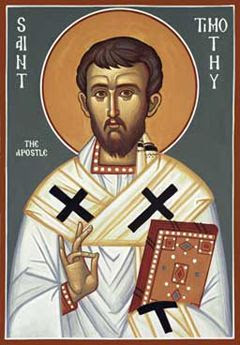| Acts 15: 36 – 16: 15 In the last few verses of chapter 15 we see the culmination of the rift between Barnabas and his colleague Paul over Barnabas’ nephew John Mark, who had abandoned the first missionary journey in Pamphylia. The disagreement being sharp, Barnabas sets sail for Cyprus with nephew Mark, and Paul takes the land route with Silas to visit the churches in Syrian Antioch, and those around his home town of Tarsus in Cilicia. Paul and Silas then take the arduous mountain route up through the Cilician Gates (from which Alexander the Great descended in route to defeating the Persians at the Battle of Issus 333 B.C.), returning to Derbe and Lystra. Paul’s practical side is on display as he takes a disciple named Timothy, the son of a Jewish woman (Jewish heritage is matrilineal) and a Greek father and has him circumcised. Hasn’t Paul just spent a good deal of time and energy arguing against the necessity of circumcision for Christian adherence? Ah, but Timothy has a Jewish mother, and so he is officially Jewish, even though it is pretty clear, since he has not been circumcised, that he had been raised a Hellenist. I served as Rector to St. Timothy’s, Apple Valley in the Diocese of Los Angeles for a time, and so Timothy is among my small pantheon of personally esteemed saints; John Baptizer (birthday), George (namesake), Timothy (patron), Edmund (patron), Paul (patron). I always felt badly for Timothy about that adult circumcision thing. |

| Paul is not as ideological as he is often portrayed to be. His astonishing openness to Gentiles, his egalitarian approach to class (neither slave nor free) and gender (neither male nor female) was quite innovative. Paul’s views were wildly expansive for a first-century male, a trained Pharisee, and a Roman citizen. We may presume that Paul has Timothy circumcised in hopes that his young protégé will prove less offensive to the Jewish adherents of the new Faith whom he hopes to encourage. We are to remain supple in service to the Gospel, this event would seem to indicate. Perhaps also we should be patient with our own internal contradictions. Paul is stubborn and inflexible in the matter of John Mark, and bends over backwards to accommodate his critics in the case of Timothy. We are not always as consistent as we imagine ourselves to be. Weirdly, Silas and Paul have been forbidden by the Holy Spirit to speak the word in Asia Minor, so they travel all the way from contemporary central Turkey to the seaport of Troas, having had a night vision in route directing them to cross the sea to Macedonia. In Macedonia they hang their hats in the proud Roman colony of Philippi, built along a major trade route between Asia Minor and the Adriatic Sea. They gather by the river to pray on the sabbath, and meet Lydia of Thyatira, a wealthy business woman and dealer in purple cloth, difficult to produce, and often reserved for royalty and the high born. She is “Theophilus,” a lover of God, receives eagerly what is said by Paul, and is baptized together with her entire household, inclusive of family, associates and slaves. Once more we see that conversion was not often an individual matter in the early Church. Entire households and large groups become adherents in this time before individualism blossomed for good and ill, and people constructed their identities in relation to others; a matter upon which I’ll touch in this coming Sunday’s sermon. Lydia of Thyatira, a woman, assumes a leadership position in the early Christian movement. The Gospel has reached Europe and taken root in an influential Roman colony. The subversion of the Empire is underway. Grace and peace, The Reverend Canon George F. Woodward III ALL IN ALL “Great light, Mover of all that is moving and at rest, be my Journey and my Destination, be my Want and my Fulfilling, be my Sowing and my Reaping, be my glad Song and my stark Silence. Be my Sword and my strong Shield, be my Lantern and my dark Night, be my everlasting Strength and my pitieous Weakness. Be my Greeting and my parting Prayer; be my bright Vision and my Blindness, be my Joy and my sharp Grief, be my sad Death and my sure Resurrection! Amen.” The Merlin Prayer Previous Reflections may be found on the parish website StPaulSMA.com under ‘Blogs’ here. YouTube postings are available here. Previous editions of THE EPISTLE can be found here. |

| St. Paul’s Anglican Church Calzada del Cardo, 6 Centro 37700, San Miguel de Allende, Mexico 415.121.3424 www.StPaulSMA.com |

